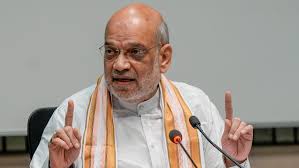
Zonal Councils Now Driving Regional Cooperation: Amit Shah

 :
| Updated On: 11-Jul-2025 @ 3:58 pm
:
| Updated On: 11-Jul-2025 @ 3:58 pmSHARE
At the 27th Eastern Zonal Council meeting held on Thursday, Union Home Minister Amit Shah stated that zonal councils have evolved from being mere discussion forums into “engines of cooperation,” resolving 83% of issues raised in their meetings. The session was attended by leaders from four eastern Indian states — Jharkhand, Bihar, Odisha, and West Bengal. Among them were Jharkhand Chief Minister Hemant Soren and Odisha Chief Minister Mohan Charan Majhi.
Amit Shah emphasized that under the leadership of Prime Minister Narendra Modi, regional councils have gained significance and become highly effective platforms for resolving inter-state issues. He pointed out that the number of zonal council meetings held rose significantly from 25 between 2004 and 2014 to 63 between 2014 and 2025. This rise reflects the growing relevance and utility of such forums.
During the meeting, several long-pending issues were discussed in detail, such as those concerning the Masanjore Dam, Taiyabpur Barrage, and Indrapuri Reservoir. Additionally, the division of assets and liabilities of various Public Sector Undertakings (PSUs) between Bihar and Jharkhand — an issue unresolved since the bifurcation of Bihar — was also taken up.
Chief Minister Hemant Soren raised serious concerns about overdue payments owed to Jharkhand by the Central government. He mentioned that over ₹1.4 lakh crore in dues remain unpaid. He cited a Supreme Court ruling from August 2023 that directed the Centre to clear mineral royalties unpaid by PSUs since 2005 in phased installments over 12 years. He urged the Home Minister to ensure swift compliance.
Soren elaborated that coal mining in Jharkhand is primarily conducted by Coal India Limited subsidiaries, namely CCL, BCCL, and ECL. These entities owe the state government significant dues, including ₹1,01,000 crore for land compensation, ₹34,213 crore under the Common Cause fund, and ₹6,219 crore in royalties for washed coal. He stressed the urgency of clearing these payments.
The Jharkhand CM also opposed proposed amendments to the Coal Bearing Areas (CBA) Act, which would grant coal companies the authority to allocate mined lands for commercial use. He argued that land is a state subject under the Constitution, and once mining ends, the land should be returned to the state after proper restructuring.
Soren highlighted the issue of illegal mining and the associated risks. Referring to a recent incident in Ramgarh district, where four illegal miners died in an abandoned coal mine, he asserted that coal companies must be held accountable for formally closing such sites. He stated that the failure to do so has not only endangered lives but has also led to the loss of property and increased illegal mining activity.
In conclusion, Hemant Soren called upon the Central government to ensure that proper mine closure procedures are followed to protect the environment and prevent further illegal exploitation. The meeting underlined the importance of cooperation between states and the Centre in addressing long-standing disputes and developmental issues.